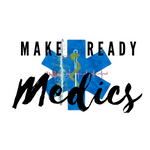Today I got derailed. I was training with the swat team. I’ve been a tactical medic for 7+ years now. Today we were doing force on force training with airsoft. I ended up as point man in the stack for a training evolution. Calling out what I see as we are moving thru a space. I’m pushing forward from a right corner fed room to a hallway that’s a 90-degree angle on the right wall. My team stacked up behind me.
As I approached the hallway I stumble. I attempt to recover as my top-heavy tactical gear drags me down. I land on my knees. No matter how I’ll lean out on a knee and look out down the hallway. No bad guy and I pop back up to my feet. Yep, that was a mistake. I number 2. didn’t tell the guy behind me I’m coming back up. So he flagged me with is training gun. That’s my fault too. Problem is I knew better too but I let the stumble derail me from what I have trained to do. I guess that’s a sign I need to train that more.
In the fast-paced, high-stakes world of Emergency Medical Services (EMS), everything seems to be about staying on course. Whether it’s following protocols, training, maintaining schedules, or keeping your cool during a crisis, the emphasis is often on seamless execution. But let’s face it: getting derailed is an inevitable part of the journey for everyone in EMS, from rookies to seasoned veterans.
The Unavoidable Setbacks
Setbacks can manifest in various forms. Maybe you’ve made a clinical error that you can’t stop replaying in your mind. Perhaps you’re grappling with burnout, feeling emotionally and physically drained by the relentless demands of the job. Or it could be something as simple as struggling to adapt to new technologies or protocols. Whatever the form, setbacks can shake your confidence and make you question your capabilities.
The Emotional Toll
The emotional impact of these derailments can be significant. In a profession where precision and quick decision-making are paramount, even a minor mistake can feel monumental. The guilt, self-doubt, and anxiety that follow can be debilitating. It’s crucial to remember that you’re not alone; every EMS professional faces setbacks. What sets you apart is how you handle them.
The Importance of Perspective
When you find yourself derailed, it’s essential to put things in perspective. A setback is not a dead-end but a detour that can lead to valuable lessons. Take responsibility for any mistakes, learn from them, and consult with mentors or peers on how to avoid similar issues in the future.
The Support System
Lean on your support system. Whether it’s family, friends, or colleagues, talking through your experiences can offer new insights and alleviate emotional burdens. Many EMS organizations also offer professional support services, including counseling and peer review programs, to help you navigate these challenging times.
The Comeback
Getting back on track often involves a combination of self-reflection, education, and sometimes, a bit of humility. It may require additional training or a temporary step back from certain responsibilities as you rebuild your confidence. And that’s okay. The road to becoming an exceptional EMS professional is not a straight line but a winding path with its share of bumps and turns.
Conclusion
Setbacks are not a sign of inadequacy but a natural part of any challenging profession. They offer an opportunity for growth, a test of your resilience, and ultimately, a stepping stone on your path to becoming a better EMS professional. So the next time you find yourself derailed, remember: it happens to everyone. What matters is not the setback itself but how you bounce back, stronger and wiser than before.
